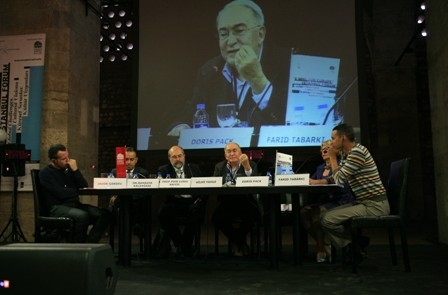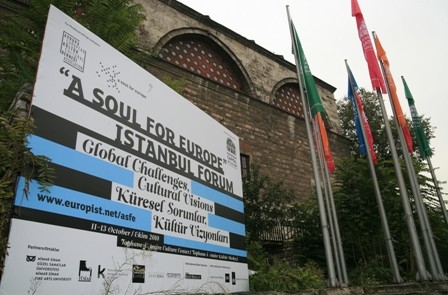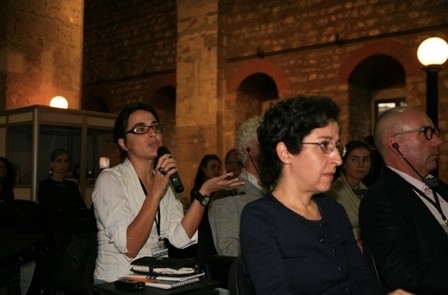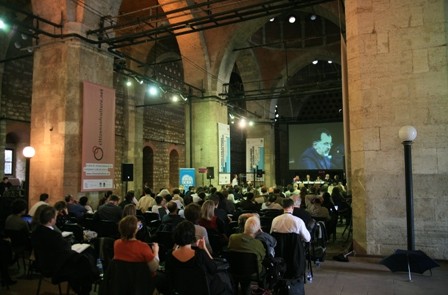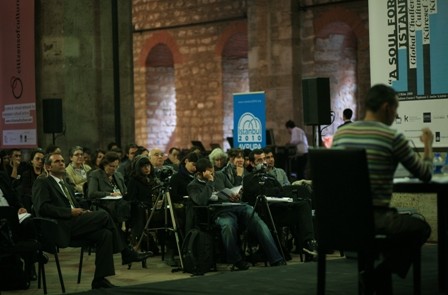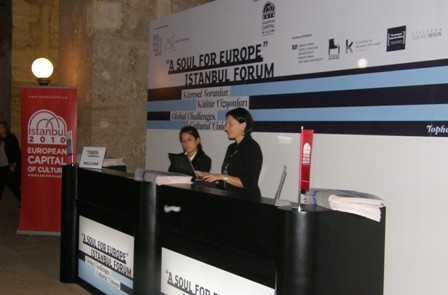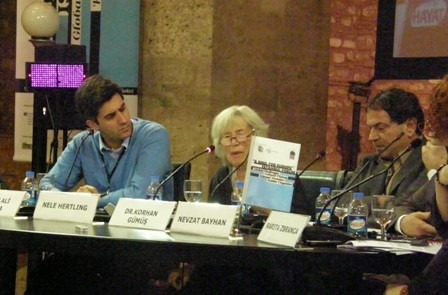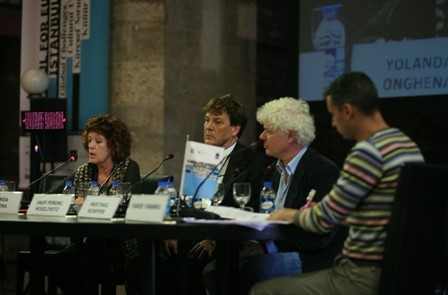Project Description
Forum Istanbul: Making and sharing profit
High ranking intellectuals, policy makers and economists call for a progressive partnership between culture and business at a conference in the European Capital of Culture Istanbul.
Forum Istanbul: Making and sharing profit
High ranking intellectuals, policy makers and economists call for a progressive partnership between culture and business at a conference in the European Capital of Culture Istanbul.
“Culture is the basis of Europe”, Şekib Avdagiç, Chairman of the Istanbul 2010 European Capital of Culture Agency said in his opening speech at Forum Istanbul – Global Challenges, Cultural Visions. He stressed the multicultural richness of the old and added that “creating economic links is a key way to eradicate differences and disagreements between nations.”
Numerous high ranking representatives of politics and society, leading intellectuals as well as artists and cultural managers from all over Europe gathered at Tophane-I Amire Culture Center for the Istanbul Forum organized by the European Cultural Association and the initiative “A Soul for Europe” on October 12 and 13, 2010. Founded in 2004, the initiative wants to implement concrete steps and conduct projects to ensure that Europe makes greater and better use of its cultural assets, utilizing culture more than in the past as a strategic factor for its development. “A Soul for Europe” currently consists of 55 civil society actors from 21 countries.
Many speakers highlighted the power of culture in supporting structural and economic development on regional, national and European level. “The Green Paper of the European Commission on culture and creative industries promotes culture being introduced on different policy levels”, MEP Doris Pack highlighted in her keynote speech. The cultural sector is rarely perceived as an engine for development of Europe, rather as something that at most absorbs resources, university professor Pier Luigi Sacco from Milan explained the double contradiction concerning the relation between culture and economy. “On the other side there is a very narrow minded focusing on those cultural industries that make profit. However in the 21st century culture is taking a more central place in the socio-economical framework”, Sacco believes.
Hungarian Professor Ferenc Miszlivetz particularly promoted the approach of cultural heritage management. A company should integrate the cultural assets of a certain region into their business model, he argued with reference to a thermal bath operator in West Hungary. “The solution could be the combination of well-being, quality tourism, learning and a sort of sustainable business”, Miszlivetz said, elaborating on ways culture can sustain an underdeveloped region. Participants also learned about private cultural centres, a common collaboration of art and business in Turkey. Hüsamettin Kavi, Chairmann of the Advisory Committee of European Capital of Culture Agency and businessman, himself was convinced that these company supported partnerships are already highly successful.
While participants widely agreed on the fact that there are many possibilities to what extent culture can benefit from the economic sector, Bahadır Kaleağası, Coordinator and EU Representative of the Turkish Industry and Business Association (TUSIAD) asked the crucial question the conference could not conclusively answer: “How can the business world explicitly profit from the cultural sphere?” Or, as Volker Hassemer from German Stiftung Zukunft Berlin put it: “Is it about sharing, or is it only about making profit?” The co-founder of the “A Soul for Europe” initiative not only called for platforms between cultural, political and economical actors “working together as European citizens based on mutual support.” He also reminded the audience that the Istanbul Forum has also been co-organized by economic partners like TUSIAD and the BDI. Vural Öger, Chairman of Öger Tours and former MEP, even went a step further by saying that “without cultural development, there is no economic development.”
But critical voices have also been heard regarding a cultural-economical cooperation: “The cultural sector must not become too dependent from the economic sector”, Bulgarian theatre and film director Javor Gardev warned with an eye to one-sided relations between culture and business regarding sponsorship. People could feel bored by an integrated Europe that is mainly based on economic principles. Frequently, speakers openly criticized the lack of a strongly needed European civil society – the European soul, as representatives of the organizing initiative underlined. They believe that the European elite is detached from large parts of the population, as illustrated during the negotiations of the European convent five years ago. Thus bottom-up discourses have to be boosted. The European civil society is still in its fledgling stages, they declared.
Furthermore, the conference agenda touched upon major global challenges like the financial crises and also included Istanbul’s role as a European Capital of Culture. This is not just a title but also a tool, Turkish theatre actor and activist Memet Ali Albora stated. “Therefore, it’s a shame that this year had no big impact on the public sphere, culture has not really been taken into consideration”, he criticized. Others said that rather a city in the Turkish regions should have been awarded with the title. Istanbul is not yet a laboratory for Europe as Turkey first has to overcome its undemocratic and non-pluralistic facets, Jan Joost Langendijk, Senior advisor of the Istanbul Policy Center said. Filmmaker Kutluğ Ataman meanwhile described the label of a cultural bridge between occident and orient as “theatre” and useless: “Unless you change the cultural policies and provide artists with a cultural environment, nothing will change.” To the end speakers by the majority agreed that arts and culture are not first and foremost about profit but about responsibility, or as British writer Simon Mundy put it in his closing remarks: “What we had, we shared.”
Andreas Bock
“Culture is the basis of Europe”, Şekib Avdagiç, Chairman of the Istanbul 2010 European Capital of Culture Agency said in his opening speech at Forum Istanbul – Global Challenges, Cultural Visions. He stressed the multicultural richness of the old and added that “creating economic links is a key way to eradicate differences and disagreements between nations.”
Numerous high ranking representatives of politics and society, leading intellectuals as well as artists and cultural managers from all over Europe gathered at Tophane-I Amire Culture Center for the Istanbul Forum organized by the European Cultural Association and the initiative “A Soul for Europe” on October 12 and 13, 2010. Founded in 2004, the initiative wants to implement concrete steps and conduct projects to ensure that Europe makes greater and better use of its cultural assets, utilizing culture more than in the past as a strategic factor for its development. “A Soul for Europe” currently consists of 55 civil society actors from 21 countries.
Many speakers highlighted the power of culture in supporting structural and economic development on regional, national and European level. “The Green Paper of the European Commission on culture and creative industries promotes culture being introduced on different policy levels”, MEP Doris Pack highlighted in her keynote speech. The cultural sector is rarely perceived as an engine for development of Europe, rather as something that at most absorbs resources, university professor Pier Luigi Sacco from Milan explained the double contradiction concerning the relation between culture and economy. “On the other side there is a very narrow minded focusing on those cultural industries that make profit. However in the 21st century culture is taking a more central place in the socio-economical framework”, Sacco believes.
Hungarian Professor Ferenc Miszlivetz particularly promoted the approach of cultural heritage management. A company should integrate the cultural assets of a certain region into their business model, he argued with reference to a thermal bath operator in West Hungary. “The solution could be the combination of well-being, quality tourism, learning and a sort of sustainable business”, Miszlivetz said, elaborating on ways culture can sustain an underdeveloped region. Participants also learned about private cultural centres, a common collaboration of art and business in Turkey. Hüsamettin Kavi, Chairmann of the Advisory Committee of European Capital of Culture Agency and businessman, himself was convinced that these company supported partnerships are already highly successful.
While participants widely agreed on the fact that there are many possibilities to what extent culture can benefit from the economic sector, Bahadır Kaleağası, Coordinator and EU Representative of the Turkish Industry and Business Association (TUSIAD) asked the crucial question the conference could not conclusively answer: “How can the business world explicitly profit from the cultural sphere?” Or, as Volker Hassemer from German Stiftung Zukunft Berlin put it: “Is it about sharing, or is it only about making profit?” The co-founder of the “A Soul for Europe” initiative not only called for platforms between cultural, political and economical actors “working together as European citizens based on mutual support.” He also reminded the audience that the Istanbul Forum has also been co-organized by economic partners like TUSIAD and the BDI. Vural Öger, Chairman of Öger Tours and former MEP, even went a step further by saying that “without cultural development, there is no economic development.”
But critical voices have also been heard regarding a cultural-economical cooperation: “The cultural sector must not become too dependent from the economic sector”, Bulgarian theatre and film director Javor Gardev warned with an eye to one-sided relations between culture and business regarding sponsorship. People could feel bored by an integrated Europe that is mainly based on economic principles. Frequently, speakers openly criticized the lack of a strongly needed European civil society – the European soul, as representatives of the organizing initiative underlined. They believe that the European elite is detached from large parts of the population, as illustrated during the negotiations of the European convent five years ago. Thus bottom-up discourses have to be boosted. The European civil society is still in its fledgling stages, they declared.
Furthermore, the conference agenda touched upon major global challenges like the financial crises and also included Istanbul’s role as a European Capital of Culture. This is not just a title but also a tool, Turkish theatre actor and activist Memet Ali Albora stated. “Therefore, it’s a shame that this year had no big impact on the public sphere, culture has not really been taken into consideration”, he criticized. Others said that rather a city in the Turkish regions should have been awarded with the title. Istanbul is not yet a laboratory for Europe as Turkey first has to overcome its undemocratic and non-pluralistic facets, Jan Joost Langendijk, Senior advisor of the Istanbul Policy Center said. Filmmaker Kutluğ Ataman meanwhile described the label of a cultural bridge between occident and orient as “theatre” and useless: “Unless you change the cultural policies and provide artists with a cultural environment, nothing will change.” To the end speakers by the majority agreed that arts and culture are not first and foremost about profit but about responsibility, or as British writer Simon Mundy put it in his closing remarks: “What we had, we shared.”
Andreas Bock


